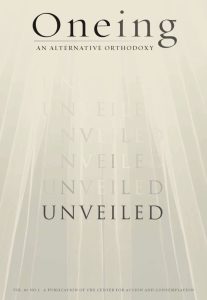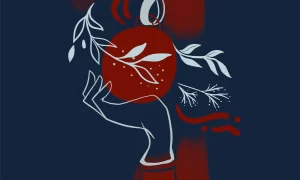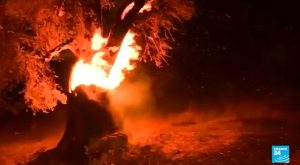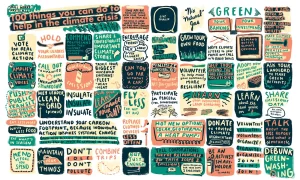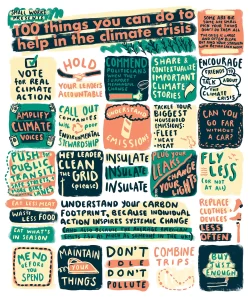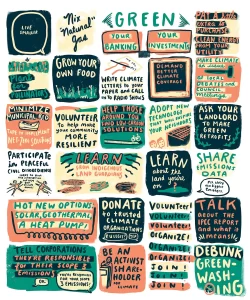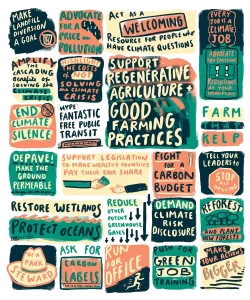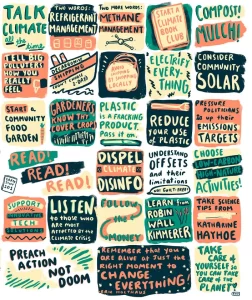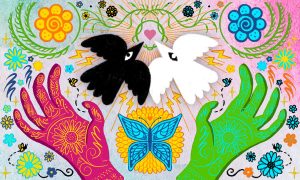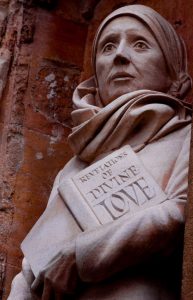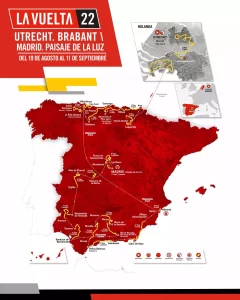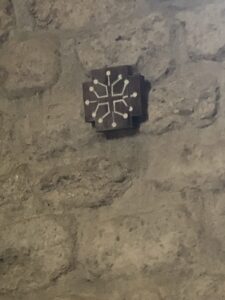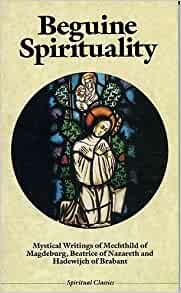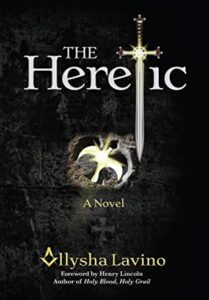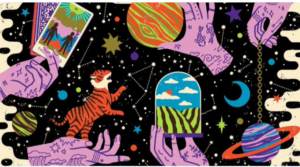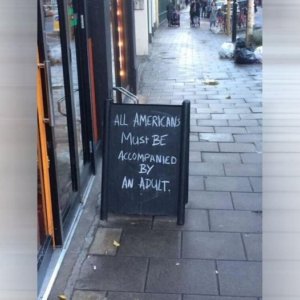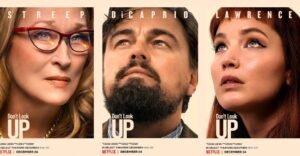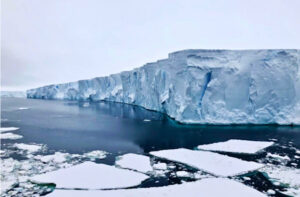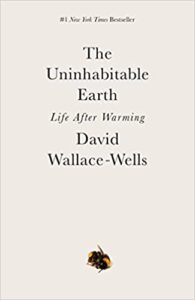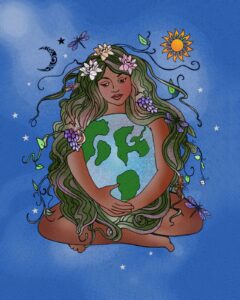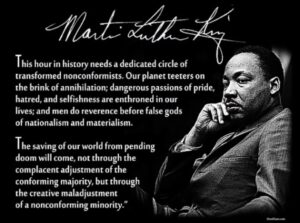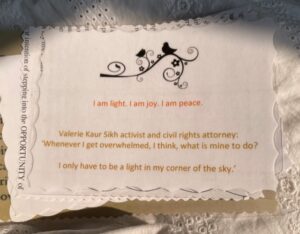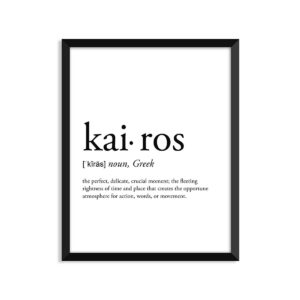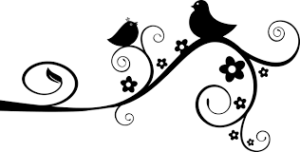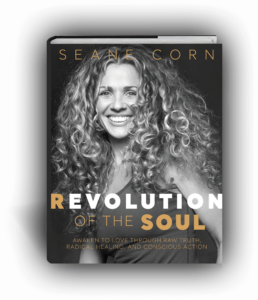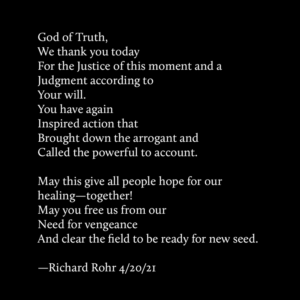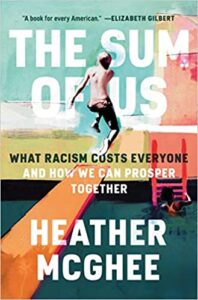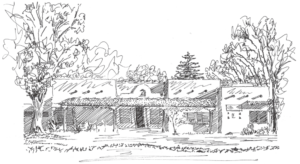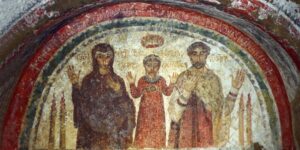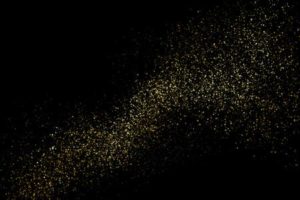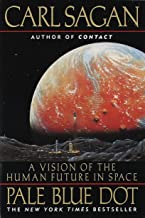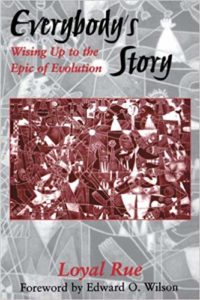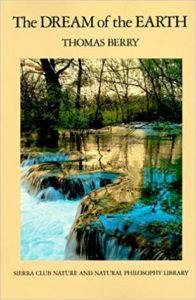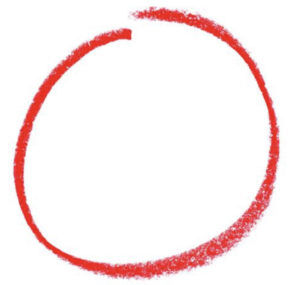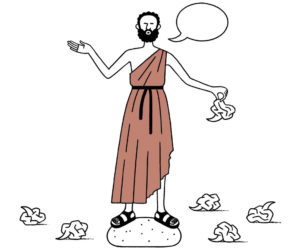Center for Action and Contemplation
Dayle in Limoux – Day #44
August 18, 2022We are not alone. The wise ones who walked before us have left luminous footprints for us to follow in our own apocalyptic time.
‘It takes a contemplative mind to spend months living and working in relative isolation because of a devastating pandemic—and not lose hope.’
♡
-Mirabai Starr
Julian of Norwich
John of the Cross
More from Mirabai.
‘Mystics see through a lens of paradox: dazzling darkness, beautiful wound, the longing that is the remedy for longing. Paradox points beyond itself to a truth that both transcends and includes logic, a truth that is alive, generative, and whole. Such a dynamic mode of knowing demands our complete attention. . . .
What does a religious woman who dwelt in an anchor-hold during the Middle Ages have to do with you and me today? Julian endured a long and cruel pandemic. The disease ravaged her community and carried off the people that she loved. She learned to shelter in place, focusing on cultivating her interior landscape and sharing the fruits of her wisdom through the window that opened from her cell onto the busy streets of her city (think computer screen and Zoom), where she offered counsel to visitors . . . each day.
And how could a renegade monk, who survived the Spanish Inquisition despite the Jewish and Moorish blood that flowed through his veins, have anything to teach us about flourishing in our own dark nights? John of the Cross illumines the transformational power of radical unknowing. He rekindles our latent longing for union with the Beloved and, through sublime poetry and precise prose, blows on the flames so that they dance back to life in our
beleaguered hearts.
He reminds us that when everything in us wants to rush out and fix the problem of our brokenness, both individual and collective, the wisest and most loving thing to do is to be still, letting go of our attachment to the way we thought the spiritual life was supposed to feel and the sense we assumed it should make.
Once we step out of our own way, into the dark and empty vessel of the soul, “an ineffable sweetness” will begin to rise, permeating and nourishing the quiet earth, uncovering a resurrection we never dreamed possible: a dazzling darkness, a radiant night, a revolutionary newness
of being.’
(This essay, and others, is included in the Oneing/Unveiled book illustrated above.)
Our ancestors, on standby and ready for our inquiry. Reading earlier this morning from YES! Magazine:
Defenders of the system [Capitalism/Philanthropy] cannot rightfully claim they were not warned. There are warnings against overreach and hubris in the founding myths, literature, poetry, and scriptures of nearly every culture on Earth. In Western literature, for example, the monster in Mary Shelley’s Frankenstein (1818), for one, is not the creature but its creator, who refused to take responsibility for what he’d done. Herman Melville’s Captain Ahab in Moby-Dick (1851) is a further warning about the penalties that accompany uncontrolled obsession in pursuit of ignoble ends. Fyodor Dostoevsky’s Grand Inquisitor gave a further warning about the perverse logic of necessity; in The Brothers Karamazov (1879), the Grand Inquisitor says to a silent Christ: “In the end they [the people] will lay their freedom at our feet, and say to us, ‘make us your slaves but feed us.’ They will understand at last that freedom and bread enough for all are inconceivable together … they can never be free for they are weak, vicious, worthless, and rebellious.”
Good essay.
‘Sometime after Adam Smith published ‘The Wealth of Nations’ in 1776, the logic of brute force infected Western economics, informing its underlying proposition that all men (mostly) have insatiable wants that justify tearing up the earth, polluting it, or frying it to death. By this logic, human survival is deemed uneconomical. But why would any even modestly sane person run the risks of destabilizing the Earth’s climate? It is impossible to comprehend the depth of nonsense in waters so turbid.’
The Disaster of Philanthropy and Capitalism
by David W. Orr
C
L
I
M
A
T
E
B R E A K D O W N
Reading about the fires in Algiers, 38 have perished thus far in this rapid and large burning fire. The planet is burning. Gaia is crying for our help.
France 24:
‘Forest fires that ravaged 14 districts of northern Algeria—a country with an already limited amount of forest.’
The country is south of Spain and east of Morocco.
Everyday I feel as though all news and information should rake away anything that doesn’t deserve what should be the planet’s number one priority: C L I M A T E. Imagine if the media focused on climate like they do president #45. I mean, if we don’t have a planet that is inhabitable, and vast majorities of people are migrating to simply live, it probably won’t matter a whole heck of a lot what he did, what he’s going to do, or what he blabbered about at a rally.
Learning that we can all do our part, however small our gesture or effort, like eating less meat, driving/flying less, removing lawns, reuse, change out older appliances (CFC’s), and lastly, hugely, V O T E for candidates who 1. Believe in climate breakdown and 2. Will work to save our planet, release the grip on U.S. fossil fuels, and amplify every step of progress that could heal our planet, collective micro efforts will create shift. WE MUST ‘LOOK UP.’ From YES! magazine:
100 Things You Can Do to Help in the Climate Crisis
In case you needed help getting started.
A New Social Justice: Solutions We Love
[YES! Magazine]
‘To heal ourselves, we must remember that we are a small part of a much greater whole.’
-Adrienne Maree Brown.
~
Buying real estate is France. Some incredible finds and quite affordable, especially when comparing housing prices in the u.s.a. right now. This is fun. A couple of guys bought a village (!) in France.
More from Julian of Norwich, lyrics based on her well-known and often shared quote:
“All shall be well, and all shall be well and all manner of thing shall be well.”
Receive the gift of healing
from the well of tears;
be washed anew
by grief and sorrowing.
Receive the gift of healing
from our mother Earth,
her deep and dark
and secret verdancy.
Receive the gift of healing
from the shaman’s touch:
the wounded healer’s power
to revive.
Receive the gift of healing
in the arms of love,
embraced in passion
and compassioning.
—
Covid. It is not over. 500 people are still dying every day in the United States. Here in France absolutely no mitigation. Many people are out and about coughing, congestion; could all very well have Covid. Even the woman who own my building, back from the hospital after two weeks, being in a coma and on respirator, will not wear a mask. Or her family. She is getting stronger, her breathing more fluid. Thank, Gaia. Yet she has not fully recovered. So. Doubling down. Again. My heart is so sad knowing how many immune compromised stay in isolation, many away from friends and co-workers…families…because they can not chance being ill. There is still so little known about the disease and it’s long-term effects. From Axios:
‘A new large-scale Oxford University study finds that people who’ve had COVID face increased risk of neurological and psychiatric issues — brain fog, psychosis, seizures, dementia — for up to two years after infection.
- The study found anxiety and depression are more common after COVID, though typically subside within two months of infection, Axios’ Rebecca Falconer writes.
Why it matters: The study, published yesterday in the Lancet Psychiatry journal, is the “first to attempt to examine some of the heterogeneity of persistent neurological and psychiatric aspects of COVID-19 in a large dataset,” an accompanying editorial says.
And Monkeypox, reportedly can infect asymptomatically. And now polio is back due to lack of vaccines in countries like Pakistan and Afghanistan; travelers/migrants can bring those viruses into another country, and many parents have opted not to vaccinate. A man in New York who contracted the polio virus is now paralyzed. Apparently, some of the vaccines…not in the U.S….vaccinate with a ‘live’ virus and that can be problematic when they do travel. This is what reportedly happened in New York, according to one doctor. And with our climate breakdown, will be seeing, and contracting, more viruses. The CDC’s choice to basically eliminate precautions, i.e., physical distancing and isolating when testing positive, is baffling.
VUELTA❗️ Starts tomorrow in S P A I N! 🚴🏻
CyclingNews:
‘The 2022 Vuelta a España starts on August 19 in Utrecht, Holland, and ends in Madrid, Spain, on September 11. The 21 stages include a team time trial, an individual time trial, several flat stages and nine of the often-steep uphill finishes the Vuelta has become known for.
Two years after the pandemic caused a postponement of the Vuelta a Espana’s Dutch start, Utrecht will finally become the first city in the world to organise the opening stage of all three Grand Tours after the Tour de France in 2015 and the Giro d’Italia in 2017.’
Jusqu’à demain.
✿
Wednesday, 1.12.22
January 12, 2022Father Richard Rohr
Center for Action and Contemplation
Once we allow the entire universe to become that alive and dynamic, we are living in an enchanted world. Nothing is meaningless; nothing is able to be dismissed. It’s all whirling with the same beauty, the same radiance. In fact, if I had to name the Big Bang in my language, I’d call it the Great Radiance. About 13.8 billion years ago, the inner radiance of God started radiating into forms. All these billions of years later, we are the continuation of that radiance in our small segment of time on this Earth. We can either allow it and let the Infinite Flow flow through us, or we can deny it, which is really what it means not to believe.
This is not something I can prove to anyone. This is nothing I can make logical or rational. It’s only experiential, and it’s only known in the mystery of love when we surrender ourselves to it, when we grant the other inherent dignity and voice—the plant, the animal, the tree, the sky, Brother Sun and Sister Moon as my Father Francis of Assisi put it.
Beguines, the ‘world’s oldest women’s movement…’
NYTIMES
Some historians believe they banded together after losing their men to the Crusades, which left behind mainly criminals and louts — beguines were not confined to the cloister. Many ministered to the poor and sick outside their walls. Lifelong celibacy was not required either. They could leave the order and marry (but not return).
Traces of these remarkable women and their idiosyncratic spiritual ways can be found today in the urban islands of quietness they once called home. Known as beguinages or begijnhofs, several dozen of these compounds are still intact (to varying degrees) from England to Germany. Ten years ago Unesco declared a select group as World Heritage Sites. No country has more beguinages (29) than Belgium, and a trip to inspect a few in three cities seemed like a pleasant way to spend a spring day, especially given the ease with which one moves by train in that convenient nation.
In its modesty, this beguinage is reminiscent of a poorly endowed college at Oxford. The bourgeois values of peace and tidiness govern all beguinages, elements that look forward to the airy clarity of the Enlightenment rather than back to the Gothic sublime of the Middle Ages.
These were “independent women who defined for themselves what it meant to live according to gospel values. Beguines were not nuns. They used their sources of income to purchase homes near the chapel or parish church where they gathered together for prayer. They emerged in the midst of a so-called first renaissance when European society was transforming itself from a narrowly defined structure of a great many peasants.
Several factors propelled this renaissance and supported the emergence of the beguines, including the Crusades and courtly culture, emerging cities and their fledging universities, a new money-based economy, the growth of lay spirituality and the cult of the Virgin Mary, as well as new monastic orders.
Additionally, there was a phenomenon called vita apostolic, which means the ‘apostolic life’ or ‘the life of an apostle.’ Beguines were a powerful expression of the vita apostolica.
Leading profound simplicity, beguines pooled their resources in order to serve the sick and destitute by building and operating infirmaries and almshouses.
- Hildegard of Bingen
- Heloise
- Marguerite d’Oingt
- Gertrude of Helfta
And many women became beguines as a result of their newfound literacy.
A heretic is a person who allegedly corrupts established faith doctrine, often by selecting a limited set of beliefs and denying the other parts of orthodox teaching.
It was a highly charged political environment in the medieval world.In a society strongly defined by each person’s specific place (such as belonging to the guilds or merchants, to aristocratic or religious classes or the the peasantry), beguines were violating their ‘God-assigned place’ in order to serve the gospel.
Beguines were under church investigation at different ties and in different parts of Europe for their spiritual independence.
While most beguines were quite orthodox, there were some religious laywomen who did join the Cathars, the Free Spirits, The Spiritual Franciscans, and other suspected heretical movements.
Most challenges of heresy, however, were politically motivated. When beguines challenged inept clergy, they made priests and bishops angry. When beguines condemned the red and corruption within the church, they made the church hierarchy angry. When beguines denounced the cruelty done to innocent laypeople through interdict, they made the popes angry. Beguine preaching would always make some men in power angry.
Beguines showed great strength and persistence and collaborated with fellow seekers, tolerated diversity, and raised difficult questions; they exercised both communal and personal wisdom and freedom to follow God as they felt called.
The story of the beguines affairs that women have contributed far more to spirituality and culture than history books have traditionally acknowledged. Their voices proclaim a divine presence that years for relationship with each of us.
These medieval women offer us hope and a fresh path: to think creatively, to collaborate to achieve change, and to live with prophetic courage.”
“A movement, rather than an order, there was no single style or pattern of beguine life.
While reacting against the wealth and ostentation of secular society, the beguines did not see poverty as an end in itself, rather they encouraged the development of the virtues of charity, humility and companionship.
Beguines worked in hospitals, visited the sick in their homes and established infirmaries.
As the church became increasingly paranoid concerning the presence of heterodox teachings, and brutal it its attempt to eradicate those it conceived of a threat, beguines, along with Jews, witches and various other sects, found themselves vulnerable and subject to frequent accusations of heresy, with often terrible consequences.”
~
The French mystic Marguerite Porete was burned at the stake in Paris in 1310, after a year and a half of imprisonment. Her crime was to repeatedly refuse to appear before the court of the inquisitorial commission to answer charges relating to her book, The Mirror of Simple Souls. During her trial, she refused to swear the oath required of her by the inquisitor’s office and she showed no remorse for having violated an injunction to withdraw her book from circulation after it had been publicly burned several years previously. Many who witnessed her execution were said to be moved to tears by her piety.
Little is known about Porete, apart from the record of her trial and what can be gleaned from her writings. It seems likely that she was associated with the beguines, a women’s religious movement which spread across northern Europe during the 13th and 14th centuries. Although the beguines devoted themselves to charity, chastity and good works, they took no religious vows and their lifestyles varied greatly, from solitary itinerants (of which Porete was probably one) to enclosed communities. The beguines were part of an era of vigorous spiritual flourishing during the Middle Ages. They were condemned by the Council of Vienne (1311-1312), which also condemned the Free Spirit Movement with which they were sometimes (and probably erroneously) identified. Although the beguine movement declined dramatically in the 15th century, some beguine communities survived until the early 20th century. The beguinage in Leuven in Belgium is a Unesco world heritage site, and to wander through its quiet cobbled roads and enclosed gardens is to feel a poignant sense of the lost history of women’s lives.
~
And this, by Allysha Lavino…recommend highly.
My review from 2020 for Amazon, Trust the Magic:
What did you see today?
What did you learn today?
What did you love today? (p.79)
Henry Lincoln chose to See, and now, Allysha has chosen to See with the eyes and wisdom of the Divine Feminine in The Heretic. Having both discovered their place in the universal pattern, Allysha invites us through beautiful and brilliant storytelling to find our own place through sacred geometry while meeting the Good People, the ancient Cathars, in Southern France. Reading The Heretic, I had the remarkable context of a Sacred Mystery Tour with Allysha and her husband, Mark, co-led by Sir Henry, to visit the sites revealed in the Languedoc region of Southern France. My hope is that if you’ve landed in this virtual space—”nothing is done par hazard” (p. xv)—either directed by the Divine Feminine or a passionate friend, you, too, will be called to physically explore the ruins and profound spiritual places Allysha excavates in the pages of The Heretic. If not, this book will be your experience. Allysha has magically captured through character and compassion the Wisdom resting beneath all things, the dualism of good and evil. During this time of pandemic and global social sadness, Allysha reminds us through her ancient research and inspired writing that suffering cannot destroy us, beauty is in everything, “though the world around us was filled with the shear chaos of the unknown” (p. 217). She gently encourages us in her story to “trust the magic,” as she gathers what Emily Dickinson called the fruits of the spirit: patience, kindness, gentleness and self-control. It is Lily’s discoveries along with her young ethereal guides at the old hotel in Alet-les-Bains who encourage us to charge the awakening. I didn’t want this book to end—gratitude to Gaia it is a trilogy! Allysha, “thank you for your wisdom…your joy…your peace…your guidance…your strength…your love (pp. 265-266). As Henry writes in his Forward, “The world has been preparing Allysha for this task for years, unbeknownst to either of us.” Baphomet, friends…the path awaits.
Author Beatrice Bruteau [1930–2014]: “We need a new theology of the cosmos, one that is grounded in the best science of our day, so that all the world turns sacred again.”
-Dayle Ohlau
Final days. #2022
December 30, 2021‘I regret nothing.’ -Edith Piaf
‘I’ve learned a great deal this year. What kind of year did you have? No matter how many challenges you’ve had, no matter what pain you’ve endured, did you do your very best? Then have no regrets.’ -A. Stoddard
As a collective we should have so many, and we can do so much better. We must. -dayle
Brian McLaren from the Center of Action and Contemplation:
“Something beautiful lies ‘unveiled’ on the other side of complexity and perplexity.”
Gatekeepers have long built razor-wire fences around us with
- beliefs
- rules
- policies
- controversies
- budgets
- programs
- activities
- rituals
- offerings
- inquisitions
Spirituality, though, is available to everyone, like wind, rain, and sun. [Brian McLaren] This is what we harness and share, and protect. “In politics, we’ve been studying war for centuries. We must now study how to crate the conditions for deep and lasting peace. We must now cherish life on earth and engage with it by focusing our best energies on learning to love neighbor, self, earth, and God…Gaia…who is Love.”
LATimes
What LA astronomers and diviners have in store for you in 2022.
-Deborah Netburn, staff writer
‘Spend time dreaming about the world in which you want to live…get specific about what real-life steps you can take to make it a reality. Ask, what does it mean to you to release the Earth, working with others to help the land rest more?’
Full piece [paywall]:
‘These are scary, uncertain times. The pandemic has thrown our lives into chaos once again. Global warming has upended the predictable flow of the seasons. The political climate is divisive and volatile. With all this anxiety swirling around us, is it any wonder that tarot readers, astrologers and other divinatory practitioners say they’ve never been busier? All of us want to know what will happen next.
From the Oracle at Delphi to the Yoruba practitioners of Ifá, there are myriad ways to approach divination and myriad reasons for wanting to see into the future. These tools can be seen as a framework to make sense of the events in our lives. Through this lens, divinatory practices encourage believers to pay attention to the patterns in their lives and the cycles of nature and to move through time with intention.
Los Angeles is among the most spiritually diverse cities in the world; we live alongside thousands of divinatory practitioners from a wide range of traditions — many of whom have devoted their lives to the study of ancient practices that go back thousands of years. As we enter a new calendar year, I asked a handful of them what archetypal energies they expect we’ll encounter over the next 12 months and how we might prepare.’
[Posted on twitter, as seen outside a pub in Europe.]
Eric Holthaus, The Phoenix:
“Any time a climate movie breaks through, it’s worthy of celebration. But this isn’t an ordinary climate movie. #DontLookUp![]() is special.”
is special.”
In the last days of 2021, a year in which Texas froze and the freakin’ ocean caught fire, the number one movie in the world on Netflix is a star-studded climate movie that’s not about climate.
Let me be super clear: Any time climate breaks through, it’s worthy of celebration. But this isn’t an ordinary climate movie. Don’t Look Up is special.
Watching it last night for the first time, I was legitimately blown away by how much I felt like I could relate to the main plot — well-meaning scientists being ignored because their message wasn’t pleasant or profitable. I was scared to watch it because I was worried it would make me feel even more depressed than I already do about being a climate communicator during these decades of climate delay, but it’s just the opposite. This is the climate movie I was waiting for.
“The reason I think Don’t Look Up works so well is because the film’s creators did their homework. There are so many Easter Eggs thrown in throughout that it’s like a love letter to climate activists. There is a massive, waiting audience for authentic climate movies like this that speak to the deep, existential anxiety of being alive at this profoundly terrifying moment in history. We know how to solve the climate emergency — stop burning fossil fuels, build up a circular, caring society, and shift political power so that nothing like it ever happens again — and yet our leaders are staring us straight in the face and saying no.
Director Adam McKay wrote that his own climate anxiety after reading David Wallace-Wells’ The Uninhabitable Earth helped inspire the film, and screenplay co-writer David Sirota wrote that empowering the climate movement was a primary goal of the film.
I reached out to McKay and Sirota, and they both confirmed this hunch I had that the movie wasn’t just a political satire, it was a gift for battle-weary activists after several long, hard years of struggle. “We literally made Don’t Look Up for the climate community,” McKay told me.
When I asked Sirota about the movie’s lack of a preachy, prescriptive call-to-action takeaways at the end, he said that was intentional.
“We want it to be a clarion call for the movement,” Sirota said, “But also respect that the movement should decide its tactics.”
The movie isn’t perfect. There’s too much of a focus on the United States, and there’s a valid criticism that seeking action from corrupt politicians during a time of crisis is counterproductive. We know that climate action at the scale and scope we need will only come from collective movements.
But that’s exactly our job now — tell more climate stories that build on this one.
This isn’t a movie that could exist without the decades of failures that have happened so far. But it’s also a movie that finally FINALLY acknowledges that the lynchpin to taking action on climate isn’t about data or carbon or graphs, it’s about finding our shared humanity.
That part is working:
Authentic climate action is way easier than shooting nukes at a comet — it’s treating each other and the Earth better. It’s listening. It’s building systems of power to replace the systems that have been built to kill us.
It’s up to us, the climate movement, to redirect the energy that Don’t Look Up gives us.”
David Wallace-Wells:
“Globally, 250 million people live within three feet of high tide lines. Ten feet of sea level rise would be a world-bending catastrophe. It’s not only goodbye Miami, but goodbye to virtually every low-lying coastal city in the world.”
“Thwaites Glacier is the size of Florida. It is the cork in the bottle of the entire West Antarctic ice sheet, which contains enough ice to raise sea levels by 10 feet.” The great Jeff Goodell on the scary signs from the “Doomsday” glacier.
Rolling Stone
by Jeff Goodall
‘The Fuse Has Been Blown,’ and the Doomsday Glacier Is Coming for Us All
New data suggests a massive collapse of the ice shelf in as little as five years. “We are dealing with an event that no human has ever witnessed,” says one scientist. “We have no analog for this”
“Given the ongoing war for American democracy and the deadly toll of the Covid pandemic, the loss of an ice shelf on a far-away continent populated by penguins might not seem to be big news. But in fact, the West Antarctic ice sheet is one of the most important tipping points in the Earth’s climate system. If Thwaites Glacier collapses, it opens the door for the rest of the West Antarctic ice sheet to slide into the sea. Globally, 250 million people live within three feet of high tide lines. Ten feet of sea level rise would be a world-bending catastrophe. It’s not only goodbye Miami, but goodbye to virtually every low-lying coastal city in the world.”
Power in disorder (Joan Didion). Let’s reclaim it now.
Order, disorder, reorder (Father Richard Rohr).
Pandemic life.
Climate Emergency.
Pari Center, Italy.
COP26 🌏
November 6, 2021‘Earth, isn’t this what you want: an invisible arising in us … what is your urgent command, if not transformation?’ -Rilke, Ninth Duino Elegy
For centuries we have been content to patch up holes temporarily (making ourselves feel benevolent) while in fact maintaining the institutional structures that created the holes to begin with (disempowering those on the margins). Now it has caught up with us. —Fr Richard Rohr, Center for Action & Contemplation
The cosmic common good provides a larger moral perspective, but it also exhorts us to “sink our roots deeper” into our native place and to work for the good of our place on Earth. —Daniel Scheid, theologian
Washington Post
“The bipartisan measure to improve the nation’s roads, bridges, ports and broadband connections won passage after liberals allowed the vote. The package, crafted by Democrats and Republicans, fulfills a major campaign promise for President Biden. It cleared the Senate on a bipartisan basis in August.”
The infrastructure plan costs $1.2 trillion over eight years, with $550 billion in new spending:
- $110 billion for roads, bridges and other infrastructure fix-ups. Of that, $40 billion is new funding for bridge repair, replacement and rehab.
- $73 billion for electric grid and power structures.
- $66 billion for rail.
- $65 billion for broadband.
- $55 billion for water infrastructure.
- $21 billion for environmental remediation.
- $47 billion for flooding and coastal resiliency, as well as “climate resiliency,” including protections against fires.
- $39 billion to modernize transit — the largest federal investment in public transit in history, according to the White House.
- $7.5 billion for electric vehicles and EV charging … $2.5 billion for zero-emission buses … $2.5 billion for low-emission buses … $2.5 billion for ferries.
Stardust & Consciousness
July 25, 2021Fr Richard Rohr:
Living in a transitional age such as ours is scary: things are falling apart, the future is unknowable, so much doesn’t cohere or make sense. We can’t seem to put order to it. This is the postmodern panic. It lies beneath most of our cynicism, our anxiety, and our aggression.
Chaos often precedes great creativity, and faith precedes great leaps into new knowledge. The pattern of transformation begins in order, but it very quickly yields to disorder and—if we stay with it long enough in love—eventual reordering. Our uncertainty is the doorway into mystery, the doorway into surrender.
Center for Action and Contemplation teacher Barbara Holmes:
The crisis begins without warning, shatters our assumptions about the way the world works, and changes our story and the stories of our neighbors. The reality that was so familiar to us is gone suddenly, and we don’t know what is happening. . . .
If life, as we experience it, is a fragile crystal orb that holds our daily routines and dreams of order and stability, then sudden and catastrophic crises shatter this illusion of normalcy. . . . I am referring to oppression, violence, pandemics, abuses of power, or natural disasters and planetary disturbances. . . .
I consider crisis contemplation to be an aspect of disorder that prepares communities for a leap toward the future. This is a leap toward our beginnings. We are not just organisms functioning on a biological level; our sphere of being also includes stardust ☆ and consciousness. We all have a spark of divinity within, a flicker of Holy Fire that can be diminished, but never extinguished.
Knock Knock,
who’s there?
Mystery and Surrender.
Please, invite me in.
- Order
- Disorder
- Reorder
“Chaos often precedes great creativity.”
K
A
I
R
O
S
“People are attracted to that that makes them feel love.”
-Marriane Williamson, A Course in Miracles
Try. Intersect great ℒℴve love with great surrender.
Inhale.
jai
A meditation from Megan McKenna on the importance of translation. Scholar and author Neil Douglas-Klotz has worked for decades with the Aramaic language, which Jesus most likely spoke as a first-century Jewish man from Nazareth. Because translation is never an exact science, Dr. Douglas-Klotz offers several possible understandings of Jesus’ teaching “Blessed are they that mourn, for they shall be comforted.”
Blessed are those in emotional turmoil; they shall be united inside by love.
Healthy are those weak and overextended for their purpose; they shall feel their inner flow of strength return.
Healed are those who weep for their frustrated desire; they shall see the face of fulfillment in a new form.
Aligned with the One are the mourners; they shall be comforted.
Turned to the Source are those feeling deeply confused by life; they shall be returned from their wandering.
Dr. Douglas-Klotz continues:
Lawile can mean “mourners” (as translated from the Greek), but in Aramaic it also carries the sense of those who long deeply for something to occur, those troubled or in emotional turmoil, or those who are weak and in want from such longing. Netbayun can mean “comforted,” but also connotes being returned from wandering, united inside by love, feeling an inner continuity, or seeing the arrival of (literally, the face of) what one longs for.
Dr. Douglas-Klotz offers this embodied prayer practice to help readers sense the powerful message of this beatitude.
When in emotional turmoil—or unable to clearly feel any emotion—experiment in this fashion: breathe in while feeling the word lawile (lay-wee-ley) [longing]; breathe out while feeling the word netbayun (net-bah-yoon) [loving]. Embrace all of what you feel and allow all emotions to wash through as though you were standing under a gentle waterfall. Follow this flow back to its source and find there the spring from which all emotion arises. At this source, consider what emotion has meaning for the moment, what action or nonaction is important now.
Inter-be.
May 29, 2021We’re not in a race to check off as many boxes as we possibly can before we are out of time. Instead, we have the chance to use the time to create moments that matter. Because they connect us, because they open doors, because the moments, added up, create a life.
-Seth Godin
“If you are a poet, you will see clearly that there is a cloud floating in this sheet of paper. Without a cloud, there will be no rain; without rain, the trees cannot grow; and without trees, we cannot make paper. The cloud is essential for the paper to exist. If the cloud is not here, the sheet of paper cannot be here either. So we can say that the cloud and the paper inter-are. “Interbeing” is a word that is not in the dictionary yet, but if we combine the prefix “inter-” with the verb “to be,” we have a new verb, inter-be.
If we look into this sheet of paper even more deeply, we can see the sunshine in it. Without sunshine, the forest cannot grow. In fact, nothing can grow without sunshine. And so, we know that the sunshine is also in this sheet of paper. The paper and the sunshine inter-are. And if we continue to look, we can see the logger who cut the tree and brought it to the mill to be transformed into paper. And we see wheat. We know that the logger cannot exist without his daily bread, and therefore the wheat that became his bread is also in this sheet of paper. The logger’s father and mother are in it too. When we look in this way, we see that without all of these things, this sheet of paper cannot exist.
Looking even more deeply, we can see ourselves in this sheet of paper too. This is not difficult to see, because when we look at a sheet of paper, it is part of our perception. Your mind is in here and mine is also. So we can say that everything is in here with this sheet of paper. We cannot point out one thing that is not here—time, space, the earth, the rain, the minerals in the soil, the sunshine, the cloud, the river, the heat. Everything co-exists with this sheet of paper. That is why I think the word inter-be should be in the dictionary. “To be” is to inter-be. We cannot just be by ourselves alone. We have to inter-be with every other thing. This sheet of paper is, because everything else is.
Suppose we try to return one of the elements to its source. . . . Without non-paper elements, like mind, logger, sunshine and so on, there will be no paper. As thin as this sheet of paper is, it contains everything in the universe in it.” –Buddhist monk and peace activist Thich Nhat Hanh
What do you see?
‘I bring a sun-shift to others when I shift my light. Darkness does not exist in the light.’ [A Course in Miracles.]
Shift.
If you feel uncomfortable with anything, you should re-consider your situation.
Cut your losses.
Far better to admit a mistake than to persist in it and allow it to develop into a nightmare.
-A. Stoddard
Dualities and Dance
May 22, 2021“Our world thrives on dualities, our systems depend upon it, and participating in separation has become so normalized that it feels as natural as breathing.
How can we create balance within our selves? We change the system by changing the people who keep it alive, and that change begins with ourselves.
We contain within us the same fundamental forces that are found in nature: stability (tamas), energy (rajas), and harmony or basic goodness (sattva). These are called gunas in Sanskrit.
These three intertwine, in various ways, to create everything (visible and invisible) in the universe and within ourselves as well. All of this weaving together happens without us being conscious of it, but we can learn to pay attention to their individual characteristics so we can figure out how they work and how we can work with them.
The Gunas in Nature and Within
A sattvic world is one of abundance, beauty, order, and balance.
To achieve sattva, things need to get moving, and rajas is the guna that makes that happen.
Rajas governs the beginning of the life cycle, brings birth and growth. It’s what causes a seed to grow into a plant and the plant to flower.
Tamas predominates the end of the life cycle; it’s the destructive force that causes the plant to break apart, die back, and return to the soil. Sattva is the time in between, when the flower is in full bloom and beauty is all around us. Nothing can live without energy (rajas) There can be no harvest, no beauty without sativa, and there can be no rebirth without tamas.
All of nature depends on a healthy relationship between creation and destruction, rajas and tamas, to support the health and the vitality of the planet and all who abide there (sattva).
Just like in nature, our physical and mental health depend on the proper interplay among the gunas. When all three gunas are in balance, everything arises (rajas), abides (sattva), and dissolves (tamas), whether we’re talking about the life cycle of a plant, an idea, a pose, or a stage of life. 🌏
Rajas is the in-breath; tamas, the out-breath; and sattva, the gap in between, the silence where liberation can happen, where magic resides, and where everything is whole.” -Seane Corn
🖤
April 21, 2021Father Richard Rohr wrote this prayer yesterday after Minneapolis police officer Derek Chauvin was found guilty of the murder of George Floyd. Richard and the Daily Meditations editorial team invite you to pray these words, along with your own, as your contemplative practice today.
Center for Action and Contemplation
Albuquerque, New Mexico
i surrender
March 28, 2021Surrender to the Divine unfolding
Surrender to the Divine surrounding
Surrender & observe
Surrender
-ishvara pranidhana
Past and Present. A community dialogue.
February 21, 2021To understand the world knowledge is not enough, you must see it, touch it, live in its presence.
—Teilhard de Chardin, Hymn of the Universe
The American Lie.
No. Not the election.
The big lie in the United States is racism only effects people of color.
Heather McGhee’s book is brilliant. She is brilliant. Her book is incredibly researched and synthesized. A must read book for every journalist, politician, policy creator, and student. Actually, you know what? Everyone should read Heather’s book. And she speaks like she writes, clearly, foundationally, and directly. We need to listen. -dayle
NPR/Fresh Air
The heart of McGhee’s case is that racism is harmful to everyone, and thus we all have an interest in fighting it. Drawing on a wealth of economic data, she argues that when laws and practices have discriminated against African Americans, whites have also been harmed. When people unite across racial and ethnic lines, she argues, there’s a solidarity dividend that helps everyone.
Heather McGhee is the former president of the progressive think tank Demos, where she spent much of her career. She holds a BA in American Studies from Yale and a law degree from the University of California, Berkeley. She currently chairs the board of Color of Change, a nationwide online racial justice organization. Her new book is “The Sum Of Us: What Racism Costs Everyone And How We Can Prosper Together.”
Heather McGhee:
This to me is really the kind of parable at the heart of the book. It’s what’s illustrated on the cover. In the 1920s, ’30s and ’40s, the United States went on a building boom of these grand resort-style swimming pools. These were the kind that would hold hundreds, even thousands, of swimmers. And it was a real sort of Americanization project. It was to create a, like, bath-temperature melting pot of, you know, white ethnic immigrants and people in the community to come together. It was sort of a commitment by the government to a leisure-filled American dream standard of living. And in many of these public pools, the rule was that it was whites only, either officially or unofficially. And in the 1950s and ’60s when Black communities began to, understandably, say, hey, it’s our tax dollars that are helping to support this public good, we need to be allowed to swim, too, all over the country, particularly in the American South but in other places as well, white towns facing integration orders from the courts decided to drain their public swimming pools rather than let Black families swim, too.
Now, I went to Montgomery, Ala., where there used to be one of those grand resort-style pools and where effective January 1, 1959, not only did they back a truck up and pour dirt into the pool and pave it over, but they also sold off the animals in the municipal zoo. They closed down the entire parks and recreation department of Montgomery for a decade. It wasn’t until almost 1970 that they reopened the park system for the entire city. And I walked the grounds of Oak Park. Even after they reopened it, they never rebuilt the pool. And that, to me, felt like this just tangible symbol of the way that a population taught to distrust and disdain their neighbors of color will withdraw from public goods when they no longer see the public as good.
Interview with Dave Davies on NPR:
https://www.npr.org/2021/02/17/968638759/sum-of-us-examines-the-hidden-cost-of-racism-for-everyone
The Daily Show with Trevor Noah
“The Sum of Us,” and underlines the importance of having honest conversations about past and present racism at a community level.
Ezra Klein/NYTimes
What ‘Drained-Pool’ Politics Costs America
I asked McGhee to join me on my podcast, “The Ezra Klein Show,” for a discussion about drained-pool politics, the zero-sum stories at the heart of American policymaking, how people define and understand their political interests, and the path forward. This is, in my view, a hopeful book, and a hopeful conversation. There are so many issues where the trade-offs are real, and binding. But in this space, there are vast “solidarity dividends” just waiting for us, if we are willing to stand with, rather than against, each other.
Also from the NYTimes.
opinion
The book That Should Change How Progressives Talk About Race
Heather McGhee writes that racism increases economic inequality for everyone.
by Michelle Goldberg
McGhee’s book is about the many ways racism has defeated efforts to create a more economically just America. Once the civil rights movement expanded America’s conception of “the public,” white America’s support for public goods collapsed. People of color have suffered the most from the resulting austerity, but it’s made life a lot worse for most white people, too. McGhee’s central metaphor is that of towns and cities that closed their public pools rather than share them with Black people, leaving everyone who couldn’t afford a private pool materially worse off.
One of the most fascinating things about “The Sum of Us” is how it challenges the assumptions of both white antiracism activists and progressives who just want to talk about class. McGhee argues that it’s futile to try to address decades of disinvestment in schools, infrastructure, health care and more without talking about racial resentment.
[…]
“Communicators have to be aware of the mental frameworks of their audience,” McGhee told me. “And for white Americans, the zero-sum is a profound, both deeply embedded and constantly reinforced one.”
This doesn’t mean that the concept of white privilege isn’t useful; obviously it describes something real. “What privilege awareness does, at its best, is reveal the systematic unfairness, and lift the blame from the victims of a corrupt system,” McGhee said. “However, I think at this point in our discourse — also when so many white people feel deeply unprivileged — it’s more important to talk about the world we want for everyone.”
Center for Action and Contemplation in Albuquerque, New Mexico.
Theologian Howard Thurman, from Walter Brueggemann, The Message of the Psalms: A Theological Commentary [1984].
Thurman takes what is personal and makes it universal. Walter Brueggemann calls this “the scandal of particularity.” [1] We “get it” in one ordinary, concrete moment and wrestle and fall in love with it there. It’s a scandal precisely because it’s so ordinary. What is true in one place finally ends up being true everywhere.
From Barbara Holmes and her lecture Race and the Cosmos, unpublished Living School curriculum.
As I considered it, the truth of the matter was that we were living within an old story; and a new story needed to be told, but we didn’t have the language for it.
The old story was of victimization, marginalization, oppression, oppressors; and the new story would see all of us evolving, self-expanding, and finding a new place in this wonderful cosmology that is a reality we have not paid attention to. So, in order to get to that point—and here is where my transformation begins—I had to reconsider what I thought about people, because I had hardened my view of others and who they were and what they meant. I had spent my time raising two little African American boys who had to be taught how to survive in society. In doing that, I taught them to view the world in only one way; and I myself was hardened into a position that either you were with me or you were against me or us.
All of that had to change. I had to begin to think of us as spiritual beings having a human experience, and not bodily, embodied folks without spirit or soul. . . . That’s a very limited view of humankind, and I wanted to expand the story. . . .
The physics and cosmology revolution that is 100 years old has not been translated into the ordinary world of any of us, and specifically not in communities of color. The world that scientists describe now is so different than the world that I grew up in or even imagined. According to physicists, this is what the world is like: it is a universe permeated with movement and energy that vibrates and pulses with access to many dimensions. . . . We are all interconnected, not just spiritually or imaginally, but actually . . . and the explicate [or manifested] order that’s all around us makes us think that we’re separate. Finally, I learned that ideas of dominance are predicated on a Newtonian clockwork universe. So, like dominoes, you push one and they all fall down, and everything is in order. But quantum physics tells us that the world is completely different. Particles burst into existence in unpredictable ways, observations affect the observed, and dreams of order and rationality are not the building blocks of the universe.
A compilation piece: 2-part documentary on PBS, The Black Church: This Is Our Story, This Is Our Song, from executive producer, host, and writer Henry Louis Gates, Jr.
It traces the 400-year-old story of the Black church in America, all the way down to its bedrock role as the site of African American survival and grace, organizing and resilience, thriving and testifying, autonomy and freedom, solidarity and speaking truth to power.
It is now available online.
https://www.pbs.org/show/black-church/
Cicely Tyson December 19, 1924 – January 28, 2021
Kennedy Center Honors, December 2015.
Jesus wasn’t a Christian.
November 29, 2020Image credit: Catacombe Di San Gennaro (detail of the fresco of the Catacomb of Saint Gennaro), paleo-Christian burial and worship sites, Naples, Italy.
“If we look at texts in the hundred years preceding Emperor Constantine’s edict, it was unthinkable that a Christian would fight in the army. The army was killing believers. Christians were on the bottom but, by the year 400, the entire army had become Christian, and was now killing the pagans. In a two-hundred-year period, Christians went from being complete outsiders to directing the inside! Once Christians joined the inside group, they had to defend their power.
Before the imperial edict of 313 that pushed Christians to the top and the center of the Roman Empire, values like nonparticipation in war, simple living, and love of enemies were common within the faithful community. The church at that point was still countercultural and non-imperial—a social movement for the reign of God. After 313 we lost that free position. Christianity increasingly accepted, and even defended, the dominant social order, especially concerning war, money, and authority.
Imperial Christianity is always about power. It seldom teaches about nonviolence, forgiveness, inclusion, simplicity, mercy, love, compassion, or understanding in a primary way. Yet Spirit-led movements within Christianity have flourished and continued to emphasize the values that defined the early Church and made it so threatening to the social order.
I believe that any future church will be led by the Spirit back to those foundational values, making it a much flatter and more inclusive community.”
-Fr Richard Rohr
Center for Action & Contemplation
Simplicity. And capitalism.
October 9, 2020From Fr Richard Rohr, Center for Action & Contemplation
When we agree to live simply, we put ourselves outside of others’ ability to buy us off, reward us falsely, or control us by money, status, salary, punishment, and loss or gain of anything. This is the most *radical level of freedom, but, of course, it is not easy to come by. It might be called foundational restorative justice, or primal solidarity with the mass of humanity and the earth. Francis and Clare created a life in which they had little to lose, no desire for gain, no loans or debts to pay off, and no luxuries that they needed or wanted.
When we agree to live simply, we have little to protect and no desire for acquisition, even for acquisition of any “moral capital.” When we imagine that we are better, holier, higher, more important to God than others, it is a very short step to “justified” arrogance or violence toward those others. It is almost inevitable, in fact, and we are witnessing today how it manifests itself at every level of our societies. If we could eliminate such manufactured and desired superiority, religion might finally become nonviolent in thought, word, and deed.
When we agree to live simply, we no longer consider immigrants, refugees, people in poverty, or anyone else on the margins of society as a threat. When we choose to relinquish our privileges, whatever they are, we have freely and consciously chosen to become “visitors and pilgrims” in this world, as St. Francis puts it. A simple lifestyle is quite simply an act of solidarity with the way most people have had to live since the beginnings of humanity.
When we agree to live simply, we have time for spiritual and corporal works of mercy, like prayer, service, and justice work, because we have renegotiated in our minds and hearts our understanding of time and its purposes. Time is not money anymore, despite the common aphorism! Time is life itself and we want to give our lives away freely.
When we agree to live simply, we have little energy to defend or protect our group, our ethnicity, our country, our money, and our religion. Our circle is no longer defined by these external and accidental qualities, because we now find the joy and beauty of the real essentials and the actual center which is God.
*Radical, from the Latin word radix meaning ‘root.’
Drawing of Thomas Merton done for The Catholic Worker by Fritz Eichenberg.
Thomas Merton:
The mystic and the spiritual men who in our day remain indifferent to the problems of their fellowmen, who are not fully capable of facing these problems will find themselves inevitably involved in the same ruin. They will suffer the same deceptions be implicated in the same crimes. They will go down to ruin with the same blindness and with the same insensitivity to the person of evil. They will be deaf to the voice crying in the wilderness, for they will have listened to some other, more comforting, voice of their own contrivance.
-Faith and Violence
Ammas & Abbas
September 29, 2020“There was always just enough virtue in this republic to save it; sometimes none to spare, but still enough to meet the emergency.”
—Sec. of State William Seward during the Civil War
Fr Richard Rohr, Center for Action & Contemplation:
The desert ascetics’ [ammas and abbas] relationships were nonpossessive: They cared for others while leaving them free. Concern for reputation was discarded. Feelings were acknowledged and listened to for their wisdom but were subjected to the discipline of the heart’s goal to seek God. The desert ascetics sought to mortify disordered passions that distracted them from their deepening relationship with God..Gaia…the Universe.
Thomas Merton:
These were people who believed that to let oneself drift along, passively accepting the tenets and values of what they knew as society, was purely and simply a disaster. -The Wisdom of the Desert
Bede Griffiths:
One of the greatest needs of humanity today is to transcend the cultural limitations of the great religions and to find a wisdom, a philosophy, which can reconcile their differences and reveal the unity which underlies all their diversities.
Seth Godin:
Professional wrestling.
Professional wrestling isn’t about wrestling, of course. It’s about who’s up and who’s down. The stated rules are there to be broken by some of the participants, and it’s not professional in any useful sense related to the sport of wrestling.
And the metaphor is powerful in many areas of life.
But we can’t understand the metaphor without understanding the forms of status that are on offer.
There is the status of affiliation. This is about belonging, about knowing and living with the rules. It’s about weaving together the culture and this affiliation leads to a form of popularity.
And then there is the status of dominance. This is about winning at any cost, cheating and subjugating. It’s about unraveling the culture in service of just one aim–victory over the others.
Professional wrestling creates tension between the two forms of status. We know that we all benefit from affiliation, but often are swayed by the avenging dominator if we see ourselves in them.
The theater of status happens in our daily lives. It’s who sits where at the meeting, or who gets to announce that the Zoom session is over. It’s the insurgent and that the status quo.
It’s the dramatic back and forth between someone who seeks power and someone who is tired of being told what to do.
The successful affiliator doesn’t seek to out-dominate the dominator. Instead, affiliators weave together enough persistent community pressure to get things back on track.
And sooner or later, people realize that the triumph of the dominator, while it can be painful, is short-lived.
Story from Our Community:
Nearly every day since we started quarantine, I sit outside for my morning prayer time. As part of this, following reading the daily meditation, I play the “Prayer for Our Community” at the conclusion where Fr. Rohr reads the prayer. When he pauses after the words, “Listen to our hearts’ longings for the healing of our world,” I quietly bring those to the energy of the space: my parents, my students, those suffering with Covid, our country’s reckoning with its systemic racism, our climate emergency.
—Tess F.
We are living liminal space.
May 30, 2020In the universe, there are things that are known, and things that are unknown, and in between them, there are doors.
-William Blake
‘In liminal space, we must leave business as usual, which often looks like a sleepwalking trance through daily life if we are not conscious, and voluntarily enter a world where the rules and expectations are quite different. Some call it voluntary displacement. When we wake up in this way and find ourselves on the threshold of something new, we are shocked into realizing that our usual trance state is not the only option, and there might just be something more.
It would be difficult to exist in this time of global crisis and not feel caught between at least two worlds—the one we knew and the one to come. Our consciousness and that of future generations has been changed. We cannot put the genie back in the bottle.’
-Richard Rohr, Oneing
“Wait and work with hope inside of the darkness.”
December 6, 2019‘We must all hope and work to eliminate suffering, especially in many of the great social issues of our time. We work to eliminate world hunger. We strive to stop wasting the earth’s resources. We peacefully fight to end violence. We don’t ignore or capitulate to suffering, yet we must allow it to transform us and the world. Suffering often shapes and teaches us and precedes most significant resurrections.
The darkness of this world will never totally go away. I’ve lived long enough and offered spiritual direction enough to know that darkness isn’t going to disappear, but that, as John’s Gospel says, “the light shines on inside of the darkness, and the darkness will not overcome it” (1:5).’
-Fr. Richard Rohr
Center for Action & Contemplation
[Image credit: Helen Keller, no. 8 (detail), 1904, Whitman Studio, The Helen Keller Foundation; colorist, Jared Enos.]
‘…we see what we believe.’
November 6, 2019We think that we believe what we see. Actually, the opposite is true: we begin with belief, and then we see. What do you believe?
-Judith Lasater, PhD.
Think about trust…whom you put your trust in. Trust is earned.
-Alexandra Stoddard
ELIZA ANYANGWE:
‘Corporations and billionaires get tax cuts while convincing individuals that our consumer choices make the world a better place.
Today, managing editor Eliza Anyangwe makes one thing clear: we must let go of our misguided devotion to personal agency and take action alongside other people if we want to bring these systems down.
History shows that the only way to change the system is to stand with the people around us and fight it head on.
Individual action isn’t bad or meaningless – it’s completely natural – but it’s no substitute for tax reform, migration policy reform, criminal justice reform, intellectual property law reform, international trade law reform and so on.
It’s clear that when we have the means, we’re happy to act – recycle, buy ethical, go green – but we need to think beyond our individual actions and choices and learn to talk, plan, and get to work alongside others if anything is going to change.
On occasion, falling down the rabbit hole that is Instagram yields positive results. It was there, on the social media platform, where I learned that American writer Anand Giridharadas would be speaking in Amsterdam. And, as though the gods of procrastination were this once glad to reward me for my fealty, the event would be free.
And so off I went to listen to the best-selling author of Winners Take All talk about the fallacy of “win-win”. Our economic model, Giridharadas explained, was indeed creating winners – who were winning by greater margins than they’d ever done at any other period in human history. But, there were also losers, left to gather up the crumbs from under the table; and a new entrepreneurial class who believed in their ability to “do well and do good”.
[…]
(American writer Anand) Giridharadas offered an answer: perhaps the success of our current system was in part thanks to the ability of that system to focus our attentions on personal agency rather than systemic transformation.
I believed in the power of my own agency: if the social enterprise lark didn’t work, I would choose an employer with a moral compass. And I would be a better consumer; picking products and services that were good for people and planet. Politicians didn’t listen, I reasoned, but corporations did, and they were in charge anyway, so I would vote with my “spending power” – boycotting those brands who had poor records on the things I cared about, and rewarding with my meagre income those companies who took their social responsibility seriously.
We scarcely consider the fact that for all of its virtues, ethical or conscious consumerism is no substitute for tax reform, migration policy reform, criminal justice reform, intellectual property law reform, international trade law reform and so on. What we have contented ourselves with doing instead is essentially playing the same game (consumerism) by the same rules (I buy, therefore I am). We’ve simply changed the ball (ethical products and services).
My guess is that we fear that if we weren’t doing this – buying better, recycling more, eating less meat – we would be doing nothing at all. We have lost sight of the value, or even the possibility, of collective action and it’s easy to see why.
“If you want to go fast, go alone. If you want to go far, go together.”
But (this) will force me to reimagine what good I can do alongside other people, rather than in spite of them. I will see and hear the challenges of those who are most intimately affected by the issues, and maybe one day, when one of us has a grand idea that can “bring the whole system down”, we’ll know other foot soldiers who can stand alongside us.’
Rev. Masando Hiraoka, Mile Hi Church in Lakewood, Colorado:
“I’ve got to make a confession: I often find it hard to relate with the religious figures of the past. Feeling this, I can also breathe into the vows of the Buddhist who takes refuge in the Buddha, the Dharma and the Sangha as my grandfather took refuge in the Colorado, the only state that welcomed Japanese Americans during World War Ii.
This is why I love Colorado, why I take such pride in where I’m form. It was sanctuary, like the sanctuary that Medina became for Muhammad, peace be upon him, and the first Muslims who were expelled from their home, their holy land of Mecca, because they were considered a threat.
The restoration of dignity and the seeking of safety is part of our legacy.
I believe we know how do do this togetherness. We’ve been taking refuge in each other forever. So we continue this great tradition of staring over again and again and let the ancient ones of the past come back alive in the present through us.
The story of peace is encoded in our DNA. Refuge is written on our bones.”
Center for Action & Contemplation:
“Religion is undergoing a massive shift in perspective . . . as wrenching as the Copernican revolution, which required humanity to bid farewell to an Earth-centered understanding of our place in the cosmos. The religious revolution on the horizon today might well be called the “Evidential Reformation.” We humbly shift away from a human-centric, ethnocentric, and shortsighted view of what is important. At the same time, we expand our very identities to encompass the immense journey of life made known by the full range of sciences. In so doing, we all become elders of a sort, instinctively willing to do whatever it takes to pass on a world of health and opportunities no lesser than the one into which we were born.” –The Rev. Michael Dowd, Eco-theologian
Fr. Richard Rohr:
An evidential worldview has become crucial. We now know that evolutionary and ecological processes are at the root of life and human culture. To disregard, to dishonor, these processes through our own determined ignorance and cultural/religious self-focus is an evil that will bring untold suffering to countless generations of our own kind and all our relations. We must denounce such a legacy. Ours is thus a call to . . . sacred activism. [Twenty-five] years ago, Carl Sagan both chided and encouraged us in this way:
How is it that hardly any major religion has looked at science and concluded, “This is better than we thought! The universe is much bigger than our prophets said, grander, more subtle, more elegant. God must be even greater than we dreamed.” . . . A religion, old or new, that stressed the magnificence of the universe as revealed by modern science might be able to draw forth reserves of reverence and awe hardly tapped by the conventional faiths. Sooner or later, such a religion will emerge. [1]
[1] Carl Sagan, Pale Blue Dot: A Vision of the Human Future in Space (Random House Publishing: 1994), 50.
More from Fr. Rohr:
“However, if we truly want to be a part of the “Evidential Reformation,” we must each do our part to understand and share the ways science and our faith affirm one another.”
The universe is a single reality—one long sweeping spectacular process of interconnected events. The universe is not a place where evolution happens; it is evolution happening. It is not a stage on which dramas unfold; it is the unfolding drama itself. . . . This [great cosmological] story shows us in the deepest possible sense that we are all sisters and brothers—fashioned from the same stellar dust, energized by the same star, nourished by the same planet, endowed with the same genetic code, and threatened by the same evils. This story . . . humbles us before the magnitude and complexity of creation. . . . It bewilders us with the improbability of our existence, astonishes us with the interdependence of all things, and makes us feel grateful for the lives we have. And not the least of all, it inspires us to express our gratitude to the past by accepting a solemn and collective responsibility for the future. —Loyal Rue [1]
[1] Loyal Rue, Everybody’s Story: Wising Up to the Epic of Evolution (SUNY Press: 2000), 42-43.
“Few things are more important than how we think about our inner and outer nature and our mortality. Thus far, the Evidential Reformation has been centered in science. Now is the time for our faith traditions to honor evidential revelation—facts as God’s native tongue—and carry on the vital tasks of interpretation, integration, and action.
Ours is the prodigal species. Having squandered our inheritance, we are waking up to our painful predicament. Thankfully God—Reality personified—awaits us with open arms and a welcoming heart. As Thomas Berry would remind us, the entire Earth community is rooting us on!” Rev. Michael Dowd
Fr. Rohr: “I believe we have squandered our inheritance, which is the earth itself, the majesties and mysteries it holds. We’ve taken it for granted, using it too freely for our own selfish purposes while ignoring the deeply divine messages communicated in everything from the smallest sub-atomic particle to the largest black holes. Surely it is time for us to bring science and religion together.”
Just as Augustine reinterpreted Christianity in light of Plato in the 4th century, and Aquinas integrated Aristotle in the 13th, today there are dozens of theologians across the spectrum re-envisioning the Christian faith. Whose ideas are they integrating now? Darwin, Einstein, Hubble, Wilson and all those who have corrected, and continually contribute to, an evidence-based understanding of biological, cosmic, and cultural evolution. . . .
Few things are more important than how we think about our inner and outer nature and our mortality. Thus far, the Evidential Reformation has been centered in science. Now is the time for our faith traditions to honor evidential revelation—facts as God’s native tongue—and carry on the vital tasks of interpretation, integration, and action. –Rev. Michael Dowd
‘You’re not crazy, you’re creative.’ ✧
November 3, 2019
A Circle expands forever
It covers all who wish to hold hands
And its size depends on each other
It is a vision of solidarity
It turns outwards to interact with the outside
And inward for self critique
A circle expands forever
It is a vision of accountability
It grows as the other is moved to grow
A circle must have a centre
But a single dot does not make a Circle
One tree does not make a forest
A circle, a vision of cooperation, mutuality and care
—Mercy Amba Oduyoye
Mercy Amba Oduyoye, “The Story of a Circle” (Circle of Concerned African Women Theologians), The Ecumenical Review, vol. 53, no. 1 (January 2001), 97. Used with permission.
✧
Fr. Richard Rohr, Center for Compassion & Contemplation
- Affirming people’s potential is more important than reminding them of their brokenness.
- The work of reconciliation should be valued over making judgments.
- Gracious behavior is more important than right belief.
- Inviting questions is more valuable than supplying answers.
- Encouraging the personal search is more important than group uniformity.
- Meeting actual needs is more important than maintaining institutions.
- Peacemaking is more important than power.
- We should care more about love and less about sex.
- Life in this world is more important than the afterlife (Eternity is Gaia’s work anyway).
✧
Rilke/New Poems:
Mohammed’s Calling
…but the angel, imperious,pointed over and over
to what was written on the page he held,
and would not held and kept insisting: read.
Then the man read, and when he did the angel bowed.
It was as if he had always been reading,
and now was able to obey and bring to pass.
✧
Alexander Stoddard/Grace Notes:
’Any profound view of the world is mysticism.’ -Albert Schweitzer
Love the questions. The bigger the questions, the better. The mysteries of life have never been understood by any human so far and never will be. The little things that make you happy, the order you put into your corner of the universe, the joy you feel from these small rituals, are mysterious. You’re not crazy; you’re creative. It’s all right if you are teased. Who cares? You do these things for yourself.
✧
A BIBLICAL ROUGH DRAFT
The New Yorker
‘Many do not know that the Bible was once a “living document,” passed orally from person to person, and from generation to generation, before finally being written down. Even the most well-known Biblical passages went through countless iterations before arriving at the final, perfect, logical, cohesive, and treasured versions we now hold dear.
Early written drafts of the Bible were the transcribed pontifications of travelling “storytellers,” who tromped from village to village in floppy sandals, swatting at flies, sipping beads of dew from the undersides of donkeys, and fighting dogs for scraps of raw meat. A close reading of the earliest known transcription of a popular excerpt from the Book of Matthew reveals that the “narrator” is suffering from low blood sugar. No doubt a syphilitic holy man dressed in desert rags, he searches in vain for just the right metaphor, a well-aimed zinger with which to make his point. The toil that the poor fellow suffers in so doing undercuts the very principle he is straining to illustrate.’
[Full essay]
https://www.newyorker.com/magazine/2019/11/04/a-biblical-rough-draft
Hope within the hopeless.
March 1, 2019Richard Rohr, Center for Action and Contemplation:
“Without a Shared and Big Story, all humans retreat into private individualism for a bit of sanity and safety.
Perhaps lack of attention to the [ancient] Mystery can be seen in the way we continue to pollute and ravage planet Earth, the very thing we all stand on and live from. Science now appears to love and respect physicality more than most religion does! No wonder that science and business have taken over as the major explainers of meaning for most people today (even many who still go to church). Christians did not take this world seriously, I am afraid, because our notion of God or salvation didn’t include or honor the physical universe. And now, I am afraid, the world does not take [this] seriously.
Hope cannot be had by the individual if everything is corporately hopeless.
It is hard to heal individuals when the whole thing is seen as unhealable.”
Tyranny & Treason
July 16, 2018Richard Rohr:
We believe our elected officials are called to public service, not public tyranny, so we must protect the limits, checks, and balances of democracy and encourage humility and civility on the part of elected officials.
We reject any moves toward autocratic political leadership and authoritarian rule. . . . Disrespect for the rule of law, not recognizing the equal importance of our three branches of government, and replacing civility with dehumanizing hostility toward opponents are of great concern to us. Neglecting the ethic of public service and accountability, in favor of personal recognition and gain often characterized by offensive arrogance, are not just political issues for us. They raise deeper concerns about political idolatry, accompanied by false and unconstitutional notions of authority.
___
DT, next to Putin, refused to say whether he believed US intelligence or Russia on 2016 elections.’ [NYTimes]
Treason: The offense of assisting its enemies, or, adhering to, or giving aid & comfort to its enemies by one who owes it allegiance.
Congress, your move.
___
The Atlantic:
The Crisis Facing America, by David Frum
The country can no longer afford to wait to ascertain why President Trump has subordinated himself to Putin—it must deal with the fact that he has. […] At the 1787 convention in Philadelphia, the authors of the Constitution worried a great deal about foreign potentates corrupting the American presidency.
America is a very legalistic society, in which public discussion often deteriorates into lawyers arguing whether any statutes have been violated. But confronting the country in the wake of Helsinki is this question: Can it afford to wait to ascertain why Trump has subordinated himself to Putin after the president has so abjectly demonstrated that he has subordinated himself? Robert Mueller is leading a legal process. The United States faces a national-security emergency.
https://www.theatlantic.com/international/archive/2018/07/trump-putin/565310/
